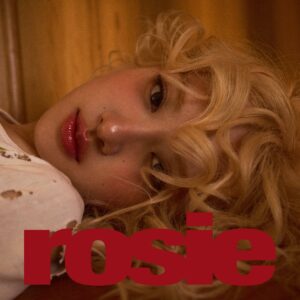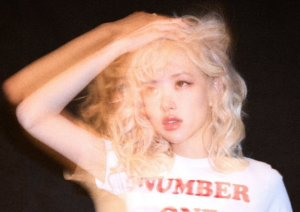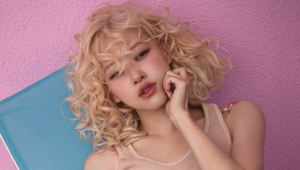
It’s the age of Black Pink solos. While all four of the globally famous quartet made solo debuts prior to 2024, the conclusion of their individual contracts with YG Entertainment launched each member into an era of reinvention and renewed creative productivity. It’s going well for pretty much everyone: Lisa and Jennie have each released multiple successful singles, and Jisoo’s acting efforts will soon enter the public eye. However, the undeniable but somewhat unlikely star of Black Pink’s next chapter is the group’s main vocalist, Rosé.
It would be blatantly untrue to call any member of the juggernaut that is Black Pink “unpopular.” That being said, Rosé wasn’t as prominent as some of her fellow members during group activities, even as her musical abilities were held in high esteem. It is those talents, and a carefully nurtured passion for songwriting, that shine through in Rosé’s 2024 releases.
Pre-release “APT.,” a collaboration with Bruno Mars, was a game-changer. The track is three minutes of endorphin-filled pop-punk perfection, and has become an organic global sensation. She followed that up with the introspective “Number One Girl,” all leading to the drop of her first full-length album Rosie.
Frankly, with “APT.” alone, Rosé has cemented her comeback as a smash success. Nevertheless, Rosie represents a tantalizing opportunity, given the hype generated by its pre-releases, the robust nature of the album on offer (12 whole tracks!), and perhaps most of all, the fact that every single song was penned by Rosé herself. After the intriguing but slight appetizer of her solo debut in 2021, and the scrumptious amuse-bouche of “APT.” and “Number One Girl,” it’s finally time to dig into the main course.
The good news is that Rosie’s title track, “Toxic till the End,” continues the album’s streak of fantastic singles. Rosé has been, unusually for K-pop, very open about the fact that Rosie often draws inspiration from her real-life romantic relationships, focusing especially on a hyper-dysfunctional, semi-recent ex. Trainwreck dynamics take center stage in “Toxic till the End,” as Rosé ruefully reminisces:
Back then, when I was runnin’ out of your place
I said, “I never wanna see your face”
I meant I couldn’t wait to see it again
We were toxic till the end
Accompanied by a wonderfully cinematic MV, “Toxic till the End” tells a deeply familiar story: At least one disastrous relationship is practically a rite of passage for many in their 20s. Rosé makes that story her own, however, conjuring a distinct mix of nostalgia and jaded rage through masterful pop-rock production choices and sharp lyrics like the fan-favorite lines:
I can forgive you for a lot of things
For not giving me back my Tiffany rings
I’ll never forgive you for one thing, my dear
You wasted my prettiest years

The bad news is that because Rosie’s singles are so strong, the rest of the album feels slightly anticlimactic. With perhaps a couple of exceptions, none of Rosie’s non-single tracks quite match the perfect combination of pop style and substance that “APT.” and “Toxic till the End” achieve, and “Number One Girl” is the most emotionally impactful ballad. Rosé and her management absolutely made the right decision to lead with their best foot forward, but the brilliant trio of Rosie’s singles is a double-edged sword.
That’s not to say that Rosie has nothing to offer. One of the album’s big-picture strengths is its range, especially sonically. Rosie has a lot of ballads, which isn’t exactly surprising given that it’s an introspective breakup album from a main vocalist. However, Rosie does a fantastic job mixing up tempos and production styles between songs, from the fast cadence and playful acoustic instrumentation of “Not the Same,” to the stripped-back production of “Number One Girl,” to the lo-fi influences in “Too Bad for Us” and “Dance All Night.” Throw in a couple of upbeat songs like “APT.,” and “Drinks or Coffee” and what you get is a subtly dynamic album that keeps listeners engaged from beginning to end.

Rosie’s musical versatility also extends to Rosé’s vocals. In her work with Black Pink, Rosé was often confined to the upper section of her vocal range and, perhaps consequently, usually stuck to a rather thin, vocal fry-heavy sound. In Rosie, she gets to stretch her wings. Her rich lower register is featured heavily throughout, and she also flexes her tonal adaptability, from the evocatively soft verses of “Toxic till the End,” to the heft of “Stay a Little Longer,” perhaps the impressive vocal showcase of the album.
While Rosie contains many excellent musical components, the album struggles with consistency. An unfortunate recurring pattern is songs with great choruses but less gripping verses, like “3am,” “Dance All Night,” and “Two Years.” The gorgeously melodic refrain of “Two Years” is particularly excellent, but its lackluster verses strip the song of momentum, making the track fall short of its substantial potential.
Two songs that buck this trend are “Drinks or Coffee” and “Gameboy,” Rosie’s hidden gems and strongest b-sides. Both are mid-to-up tempo tracks with catchy, rhythmic verses that flow directly into instant earworm choruses. They also share a playful lyricism. “Feeling so good at a bad party,” Rosé sings of running into a maybe-more-than-friends acquaintance in “Drinks or Coffee,” Rosie’s only wholly cheerful track besides “APT.” Meanwhile, “Gameboy” has a more jaded sense of humor, with Rosé lamenting her hopeless playboy gameboy, making it a spiritual cousin of “Toxic till the End.”
Alas, Rosie also struggles with inconsistency lyrically. Overall, Rosie deserves enormous praise for bucking K-pop norms by being a truly confessional album. While confessional albums are the bread-and-butter of much of Western pop, the absurd personal standards idols are still often held to makes openly confessional music an extreme rarity in K-pop.
In this context, Rosie feels like a breath of fresh, and even subversive, air. At times, Rosé’s raw lyricism hits hard, like in the wrenching “Number One Girl,” which she has said was inspired by her reaction to reading online hate comments. Some of her throw away observations in songs like “Toxic till the End” and “Gameboy” also strike a chord, and even the slightly clumsy lyrics of the meandering “Not the Same” and “Call it the End” have real resonance; Their lack of polish actually adds to the sense of authenticity.
At other times, however, Rosie can feel repetitive lyrically in a way that it largely avoids musically. In the track order, the back half of the album especially struggles with this, as “Stay a Little Longer,” “Not the Same,” “Call it the End,” and “Too Bad for Us” present the same breakup story, one after another, with only slight variations. “Stay a Little Longer” and “Too Bad for Us” also occasionally wander into platitudes:
Flying high with both eyes closed
Almost touched the sun, I guess we got too close
Now I’m dancing on my own
But the music’s not as good when you’re alone

It is interesting to consider how the idol rules that do, to some extent, still apply to Rosé might have subtly restricted her confessional songwriting, perhaps leading to the inclusion of platitudes. That’s all conjecture, but a fascinating, simultaneously candid and withholding interview conducted by the New York Times on the eve of Rosie’s release does offer a glimpse into the publicity tightrope Rosé is walking.
Of course, heartbreak is also a deeply universal experience, so a handful of general lyrics are not unusual and can be forgiven. However, when every other line feels like it could have come from a myriad of other pop singers, that starts to sap songs of a sense of individuality. Since individuality is the primary appeal of a confessional album, that’s no small problem.
With the biggest lyrical issues emerging in Rosie’s back half, that does raise the question: Does the 12-track album overstay its welcome? In a K-pop landscape increasingly dominated by teeny tiny mini albums, and even more itty-bitty title tracks, questioning the gift of a full-album worthy of the name feels almost heretical. Nevertheless, an argument could be made that Rosie would have been a better musical product if it had downsized to its strongest 5-to-7 tracks.

That being said, Rosie isn’t just an album: it’s a comeback at a pivotal moment in Rosé’s career. From that perspective, Rosie being a full album is a brilliant strategic decision that emphasizes how Rosé the soloist is taking a different path from the notoriously music-shy Black Pink. Indeed, Rosie’s most commendable achievement is how successfully it re-introduces Rosé, the soloist born from but distinct from Black Pink, to the world.
That this was achieved while Rosé remained (the only Black Pink member) under The Black Label, working with Black Pink main-producer Teddy Park, adds both a twinge of irony and even greater weight to the achievement. Despite its inconsistencies, Rosie is a quietly revolutionary album. Its confessional nature subverts K-pop industry expectations, which notably often fall heavier on female stars. Even more critically, Rosie confirms the arrival of a soloist and songwriter with creative ambition and global appeal. Rosé is here, and it’s hard to imagine that she’ll ever be underestimated again.
(Billboard[1][2], Teen Vogue, Twitter, YouTube[1][2][3]. Images from Atlantic Records, The Black Label, Instagram, Kenneth Cappello.)

0 Comments